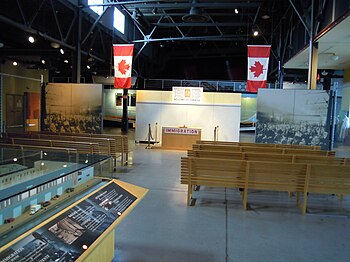 |
| English: The recreation of the immigration hall at Pier 21, Halifax, Nova Scotia, Canada. (Photo credit: Wikipedia) |
Canada's immigration minister points to an aging population and looming labour shortages
By Susana Mas, CBC News Posted: Aug 12, 2016 6:03 PM ET Last Updated: Aug 12, 2016 7:03 PM ET
If Immigration Minister John McCallum gets his way, Canada will significantly increase immigration beyond its current record level as a way to fill the country's labour needs.
Pointing to an aging population and looming labour shortages, McCallum made the pitch in Manila during a speech to the Canadian Chamber of Commerce in the Philippines on Friday.
"So why not substantially increase the number of immigrants coming to Canada? And that is, I think, I hope, what we are about to do," McCallum said, according to a transcript of his remarks obtained by CBC News.
- Earlier in the week, McCallum was in Beijing, where he sought to open more offices where Chinese can apply for visas, in the hope of attracting more high-skilled workers.
The Trudeau government is already seeking to admit between 280,000 and 305,000 new permanent residents in 2016 — a record increase from the 260,000 to 285,000 newcomers the previous Conservative government had planned to welcome by the end of 2015.
Key to the Liberal government's larger plan to promote innovation and grow the economy is McCallum's three-year immigration plan, which he plans to unveil this fall.
McCallum said no final decision on immigration has been made and that he has to get his cabinet colleagues on board with his new plan and convince Canadians it's the right thing to do.
"But the direction in which I would like to go is to increase substantially the number of immigrants," McCallum said Friday.
Reducing 'barriers' to immigration
The express entry system launched under the previous Conservative government promised transformative changes to Canada's economic immigration policy.
McCallum will ease some of the rules to make it easier for international students to come to Canada and become permanent residents.
He is also going to eliminate what is known as a labour market impact assessment (LMIA) — a document all employers need to hire foreign nationals over Canadian workers.
Businesses have said it is the biggest flaw with express entry, a requirement the previous government borrowed from the temporary foreign worker program.
The Liberal government also tasked a parliamentary committee with a review of the controversial foreign worker program, but Parliament adjourned before the report was tabled. It will now be made public in the fall.
"So we're going to make it easier for international students, we're going to reduce some of the barriers in our immigration system … we don't think that every immigrant needs to go through what we call a labour market impact assessment process. We think it can be simplified. We think there are some rules which are no longer necessary," McCallum said.
"Now, we have to convince Canadians of this. But I think it's a good idea."
McCallum, who worked as a chief economist at one of Canada's Big Five banks and a professor of economics before he entered politics, also acknowledged he has his work cut out for him.
"Not every Canadian will agree. But I think with our mindset of welcoming newcomers in the beginning, with the facts of the labour shortages, aging population, we have a good case to make, and I think we will be able to convince a higher proportion of Canadians that this is the right way for Canada to go."
Philippines is currently the top source country for permanent residents in Canada, according to data published by Immigration, Refugees and Citizenship Canada as of May 31.
The immigration minister also said that processing times for reuniting families from the Philippines has dropped "dramatically" to 12 months, "cut in half in just a year."
The Liberal government promised during last fall's federal election campaign to reduce processing wait times in all categories.
Follow @SusanaMas on Twitter.

